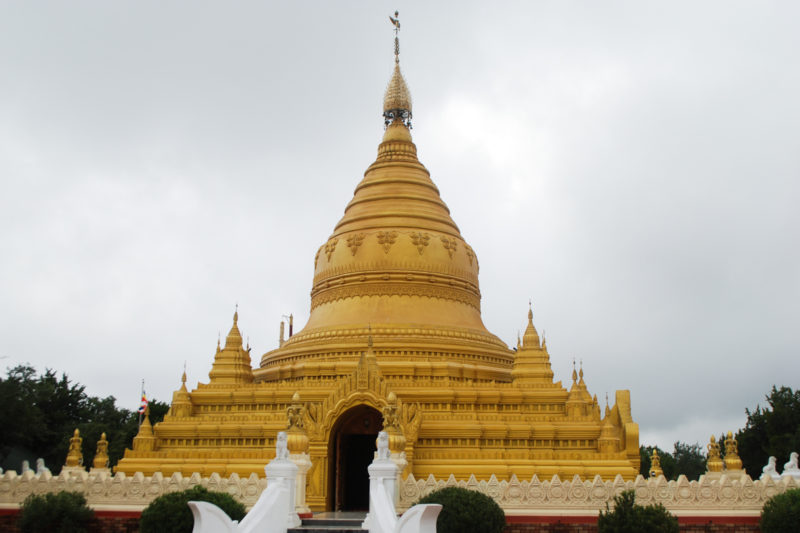Founder of Austin Buddhist Temple Stirs Controversy
By Shepard Price
Reporting Texas

The Burmese-style pagoda is the main focal point of the Sitagu Buddha Vihara Temple in Austin. Shepard Price/Reporting Texas.
Fifteen miles west of downtown Austin, in what feels like the middle of nowhere, a gold-domed Buddhist temple sits nestled in the Texas Hill Country. It is one of only a handful of structures in North America built in the architectural style of Myanmar Buddhist temples.
The Sitagu Dhamma Vihara Temple was founded by in 1996 by Sitagu Sayadaw. Photos of Sayadaw with world leaders, including Barack Obama and the Dalai Lama, hang on the walls of the temple office. A mural of Sayadaw is painted in the dining space.
Sayadaw is perhaps the most prominent religious figure in the Southeast Asian nation of Myanmar. He is a Buddhist monk whose work has led to the building of hospitals across that country, the founding of monastic colleges and humanitarian projects, including efforts to provide relief to hurricane-stricken parts of Myanmar after a massive storm struck the country in 2008. The government of Myanmar has awarded multiple titles to Sayadaw, including Aggamahā Ganthavacakapandita, which, in Burmese, means great wise man in preaching and teaching. He is also a man whose critics say has said things condoning the ethnic cleansing of the Rohingya people in Myanmar.
In October, at a military base in Myanmar, Sayadaw delivered a sermon that appeared to suggest that the murder of the Rohingya, a Muslim-majority ethic group in in the country, is justified because the group is sub-human.
During the sermon, Sayadaw argued that violence committed in defense of Buddhism can be justified, said Bhikkhu Cintita, a monk in residence at the Sitagu Dhamma Vihara Temple.
“I regret that Sitagu Sayadaw is taking these stances,” Cintita said. “This is just not a Buddhist teaching. This is a very big mark on [Sayadaw]’s reputation.”
Ward Keeler, a University of Texas at Austin anthropologist who has done work in Myanmar, says that much of the racist fearmongering in relation to the Rohingya follows a very clearly set script and that the Buddhist monks, worried about their role in the country, follow that script. That may include Sayadaw, as “Sayadaw is no more enlightened on the subject than any of the people in Myanmar,” Keller said.
“The monks could see that big changes were coming and they decided to find a new way to justify their claims on prestige, on wealth, on authority. Arousing fears about a Muslim takeover was a very effective way for them to create a very important role for themselves in Myanmar society,” Keeler added.
The Rohingya people have faced persecution in Myanmar for decades, and since 2017 perhaps more than one million Rohingya have fled to Bangladesh to escape arbitrary detention and murder committed by the Myanmar military, Keller said.
The Buddhist-led government has also placed 128,000 Rohingya in camps. These “can only be called concentration camps” Keeler said. While Reuters reported in December that some camps may be closing, the Rohingya are still facing circumstances that amount to what some observers have called ethnic cleansing.
In September, the United Nations’ Independent Fact-Finding Mission on Myanmar issued a report concluding that the “widespread and systematic violence” against the Rohingya community by Myanmar’s military and other security forces amounted to “the gravest crimes under international law.”
The secretary at the Sitagu Dhamma Vihara Temple, Win Bo, says Sayadaw only visits Austin once a year and is usually in the city for less than a week.
Sayadaw doesn’t manage day-to-day temple affairs, Bo said. “He would come and visit us and maybe instruct us on some of the constructions that he thinks needs to be fixed or give advice on what classes should be run or what kind of activities we should do here, to help teach and help people learn,” Bo added.
During an interview at the Austin temple, Cintita said people of Rohingya descent have fled Myanmar and ended up in Austin, and the monk wants to help them both in Austin and Myanmar.
“I personally have a Rohingya relief fund that I set up, largely in response to what I’ve heard about what Sitagu Sayadaw,” Cintita said.